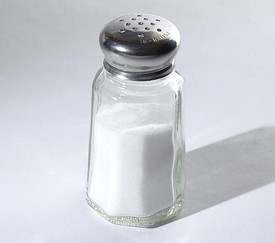
Whenever the Israelites brought animal sacrifices as meal offerings, sin offerings or guilt offerings, the meat would go to the priests as their holy portion. The Kohanim also would receive the oil, wine, grain and fruits that the Israelites brought to worship God.
God calls this arrangement a "Covenant of Salt" (Numbers 18:19). The phrase is unusual and it only appears in one other place in the Hebrew Bible (II Chronicles 13:5), where it describes the relationship between God and the descendants of King David. From the context, it is clear that a "Covenant of Salt" is one that lasts forever – it is unending.
But why? What is the quality of salt that is eternal?
According to the great medieval commentator Rashi, it is "because salt does not spoil," and that makes perfectly good sense. Since ancient times, people have noticed that, unlike oil or milk, for example, salt never goes bad. Salt that has been stored for decades will remain just as good as the day it was placed in its jar.
But there is also another possibility.
We think of salt primarily as something that gives flavor to food. Before the invention of refrigeration, though, salt was used mostly as a preservative. Meats and vegetable cured with salt last a long time because salt removes liquid from food and it inhibits the growth of microorganisms that cause spoilage. If the phrase "Covenant of Salt" refers to salt's quality as a preservative, there are some interesting implications.
Salt does allow foods to be kept for a very long time, but it does not leave them unchanged. Salted foods take on the flavor of salt. They lose most of their moisture. They may even shrivel up and change in size and texture. A pickle, for example, is noticeably different from a cucumber. Salt may not change over the decades, but food preserved with salt certainly does.
If the Kohanim experienced that kind of "Covenant of Salt," they were transformed by being God's appointed ritual leaders. Their relationship with God took something away from them, and it gave them some new qualities.
This is the observation of Rabbi Yisrael Yehoshua Trunk of Kutno. Writing in the mid-nineteenth century, he said that just as salt causes food to decrease in size, yet keeps it from spoiling for a long time, the same is true when one brings an offering. "What is given is lost, yet the donors establish their assets forever."
What does he mean? Put simply: When we give, we get.
The Kohanim spent their lives serving God, and they certainly were aware that their service was not directly for their own benefit, but for the benefit of God. Their backs may have ached from heaving and slaughtering large animals, but, unlike the farmer or the shepherd, they understood that it was not done to improve their land or build up their flocks. The Kohanim had no land or flocks to call their own.
The reward the Kohanim received was not just in the form of the meat, fruit and grain they got from the sacrificial offerings of others, it was also the reward of serving something beyond themselves. The service itself was a reward and it changed them. It may have made them more grateful, more modest, and more devoted to God.
This is what Trunk of Kutno wants us to notice. The Covenant of Salt, and our service to God, does not exist so that we will feel self-satisfied as we are. If it does not change us in some way, we're not doing it right. A life devoted to Torah and to God is a life that is willing to be drained and refilled – to be transformed and challenged. When we give of ourselves, and give up something of ourselves, God helps us to become new people.

 RSS Feed
RSS Feed
